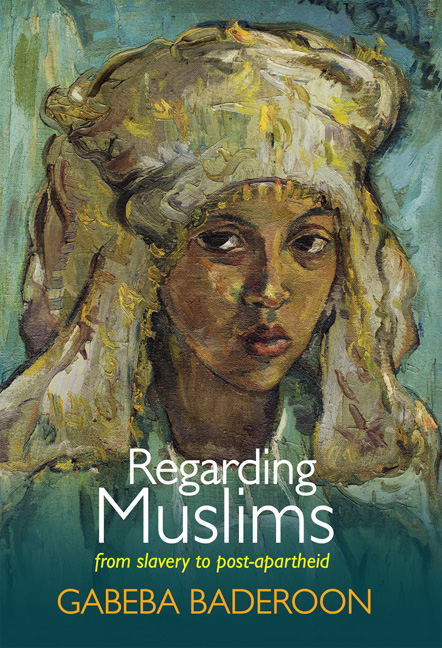Book contents
- Frontmatter
- Contents
- List of illustrations
- Acknowledgements
- Foreword
- Introduction: Beginnings in South Africa
- Chapter 1 Ambiguous Visibility: Muslims and the making of visuality
- Chapter 2 “Kitchen Language”: Muslims and the culture of food
- Chapter 3 “The Sea Inside Us”: Parallel journeys in the African oceans
- Chapter 4 “Sexual Geographies of the Cape”: Slavery, race and sexual violence
- Chapter 5 Regarding Muslims: Pagad, masked men and veiled women
- Chapter 6 “The Trees Sway North-North-East”: Post-apartheid visions of Islam
- Conclusion
- Notes
- Glossary
- Bibliography
- Index
- Plate section
Chapter 6 - “The Trees Sway North-North-East”: Post-apartheid visions of Islam
Published online by Cambridge University Press: 21 April 2018
- Frontmatter
- Contents
- List of illustrations
- Acknowledgements
- Foreword
- Introduction: Beginnings in South Africa
- Chapter 1 Ambiguous Visibility: Muslims and the making of visuality
- Chapter 2 “Kitchen Language”: Muslims and the culture of food
- Chapter 3 “The Sea Inside Us”: Parallel journeys in the African oceans
- Chapter 4 “Sexual Geographies of the Cape”: Slavery, race and sexual violence
- Chapter 5 Regarding Muslims: Pagad, masked men and veiled women
- Chapter 6 “The Trees Sway North-North-East”: Post-apartheid visions of Islam
- Conclusion
- Notes
- Glossary
- Bibliography
- Index
- Plate section
Summary
We etch ourselves into … culture, in complex
palimpsests of knowledge and desire.
– Meena Alexander (1998: 152)[A]nd what we said about it became a part of what it is.
– Wallace Stephens (1965 [1954]: 159)Novel spaces
This last chapter considers the multifaceted visions of Islam produced in recent South African drama, poetry, fiction, film and memoir. The texts I explore below amplify areas of complexity and subversiveness already present in performances of self, food practices and oral narratives (as discussed in previous chapters). They radically reimagine Muslim presence in South Africa.
As part of the great flowering of culture in the post-apartheid period, artists and writers have re-envisioned Muslim life. Such experiments are evident in recognised genres such as theatre, film, music, literature and visual art, and also through newer avenues such as slam poetry, blogs, listserves, standup comedy, performance collectives and self-published novels and poetry. Many writers straddle both spaces, producing prize-winning publications and simultaneously charting new pathways for disseminating their work, including the playwright and poet Malika Ndlovu, the activist and slam poet Mphutlane wa Bofelo, the poet, essayist and blogger Rustum Kozain, the actor and comedian Riaad Moosa (who starred in the recent film Material), and Shabbir Banoobhai, the author of several influential poetry collections, who has more recently self-published new anthologies and a novel titled Heretic. In 2009, the activist group The Inner Circle published Hijab: Unveiling Queer Muslim Lives, a ground-breaking collection of autobiographical writing by members of lesbian, gay and transgender Muslims. Memoir has long been a radical form in which to portray dissident visions of Muslim life, as is demonstrated in Zackie Achmat's riveting memoir about his life as a gay Muslim man in Defiant Desire (1994). Achmat also has a significant profile on Facebook, where he publishes essays that continue this intersection of confession and politics.
Political memoirs have provided nuanced visions of political activism, filling an important absence. The 2003 memoir Our Generation by the activist and journalist Zubeida Jaffer is a supple account of the role of Muslims in the anti-apartheid struggle, and includes the political, intimate and religious aspects of her life. Our Generation attends to Jaffer's role as an activist and mother who was imprisoned and tortured by the apartheid government. She shares her doubts as well as the resoluteness of her faith during the struggle against political injustice.
- Type
- Chapter
- Information
- Regarding Muslimsfrom slavery to post-apartheid, pp. 133 - 152Publisher: Wits University PressPrint publication year: 2014



